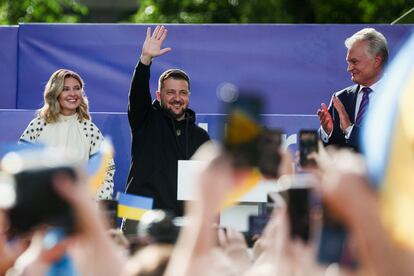NATO will invite Ukraine to join ‘when conditions permit’
Zelenskiy charges that the allies’ agreement is undefined and warns it could benefit Russia

On Tuesday, the North Atlantic Treaty Organization (NATO) took an important step by agreeing to extend an “invitation” to Ukraine to join the alliance, but only when “conditions” allow it. Thus, at the decisive Vilnius summit, leaders of NATO’s member-countries sought to demonstrate that Kiev’s place is within the Alliance, though not immediately and not while the war continues. These unspecified “conditions” left the Ukrainian president, Volodymir Zelenskiy, deeply dissatisfied. Even before the agreement was made public, he railed against a promise that he considered vague; he also said that it could benefit Russia by introducing the option that Kiev’s NATO membership could be a subject for discussion in hypothetical peace negotiations.
“We have affirmed that Ukraine will become a member of NATO,” NATO Secretary General Jens Stoltenberg stated on Tuesday at a press conference. “This is a strong package for Ukraine and a clear path towards its membership in NATO,” he added, in response to Zelenskiy’s public criticism.
“It’s unprecedented and absurd when (a) time frame is not set, neither for the invitation (to join NATO) nor for Ukraine’s membership. While at the same time vague wording about ‘conditions’ is added even for inviting Ukraine,” Zelenskiy wrote on his social media before leaving for Vilnius. “It seems there is no readiness neither to invite Ukraine to NATO nor to make it a member of the Alliance,” the Ukrainian president lamented. “And for Russia, this means motivation to continue its terror.” The message reveals Zelensky’s disappointment; he is seeking greater clarity on what those “circumstances” are and wants a timetable for joining.
The Ukrainian leader’s statements represent strong pressure on the allied leaders as they arrived at the decisive Vilnius summit, where the relationship with Kyiv is to be decided amid some divisions over the degree of commitment to the country’s future membership. Eastern flank countries are pushing for an agreement favorable to Ukraine. But the United States and Germany favor a more cautious position.

The text to which the allies ultimately agreed includes the word “invitation,” which Kyiv wanted to see; it did not appear in previous versions of the final declaration. That is a clear concession by Berlin and Washington, and it also removes Ukraine from the formal MAP process (Member Action Plan with concrete guidelines to be met before entry). This gesture is intended to speed up Ukraine’s path to entry.
It has been determined that Ukraine is not yet ready to join NATO and cannot do so until the war is over. Zelenskiy seems to have acknowledged that during Spanish President Pedro Sanchez’s visit to Kyiv, when the Ukrainian leader said: “At the Vilnius summit, we need a very strong and clear signal that Ukraine has the right to become a member of NATO after the war; now the issue is to provide more substance to the prospect of membership [than] at the Bucharest summit in 2008.” At that time, it was stated that Ukraine and Georgia would become NATO members, but the declaration was undefined and lacked guarantees, which exposed Kyiv to the Kremlin’s reaction.
Meanwhile, a United States-led group of countries—which includes Germany, the United Kingdom and France but could be expanded to the G-7 countries and even other nations like Poland—is planning to offer Ukraine a “security mechanism” or “security arrangement” on a bilateral basis, as EL PAÍS reported. These political framework agreements are designed to ensure that arms continue to reach Ukraine and serve as a deterrent to attacks on the country.
Ukraine’s path to NATO membership was not the only issue discussed at the summit. New commitments to ad hoc aid were also announced in Vilnius. For instance, French president Emmanuel Macron promised to deliver longer-range missiles to Kyiv. French military sources told several press agencies that they will supply Scalp model missiles, which the United Kingdom has already supplied to Kyiv. These missiles have a range of 250 kilometers (about 155 miles). For its part, Germany announced a new military aid package worth €700 million ($770,143,500). It includes two Patriot anti-aircraft defense-system launchers, 40 Marder combat infantry vehicles, 25 tanks and 20,000 pieces for artillery firing.
In addition, a coalition of 11 countries will begin training Ukrainian pilots with test flights of U.S.-made F-16 fighter jets in Denmark in August. A training center will also be established in Romania. Along with the Netherlands, Denmark has pushed hardest to start supplying these aircraft, which Kyiv has requested. “We hope to start seeing results early next year,” Danish Minister of Economic Affairs Troels Lund Pulsen said on Tuesday in Vilnius (he replaced the Danish Minister of Defense at the summit).
Sign up for our weekly newsletter to get more English-language news coverage from EL PAÍS USA Edition
Tu suscripción se está usando en otro dispositivo
¿Quieres añadir otro usuario a tu suscripción?
Si continúas leyendo en este dispositivo, no se podrá leer en el otro.
FlechaTu suscripción se está usando en otro dispositivo y solo puedes acceder a EL PAÍS desde un dispositivo a la vez.
Si quieres compartir tu cuenta, cambia tu suscripción a la modalidad Premium, así podrás añadir otro usuario. Cada uno accederá con su propia cuenta de email, lo que os permitirá personalizar vuestra experiencia en EL PAÍS.
¿Tienes una suscripción de empresa? Accede aquí para contratar más cuentas.
En el caso de no saber quién está usando tu cuenta, te recomendamos cambiar tu contraseña aquí.
Si decides continuar compartiendo tu cuenta, este mensaje se mostrará en tu dispositivo y en el de la otra persona que está usando tu cuenta de forma indefinida, afectando a tu experiencia de lectura. Puedes consultar aquí los términos y condiciones de la suscripción digital.








































